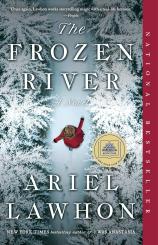The Frozen River
Review
The Frozen River
In her latest novel, THE FROZEN RIVER, Ariel Lawhon continues to write historical fiction based on the lives of real women who often made an important contribution to history. Martha Ballard is a midwife, and the story takes place shortly after the Revolutionary War in Maine over a six-month period when the Kennebec River, the frozen river of the title, is iced over. Martha and her family live on the river, and a mill her husband built is his livelihood. When it freezes, so does the transportation of logs downriver. Winter is a time for repairs and introspection.
This particular winter is also one of intrigue, murder, suspicion and betrayal as we view the events that Martha is involved in --- and that threaten her and her family. In the Prologue, we learn of the murder of a man. His death is, in a way, the event that this novel is built around --- the mystery that will be solved. Why was Joshua Burgess killed? It seems there are several people who wanted him dead, and it is a certainty that he deserved it. But while Lawhon teases us with several possibilities, in the end, his passing isn't as important as the life of Martha.
"A book club would have myriad topics to discuss after reading this thoughtful novel about a time when the health care of women was often better left entirely to women themselves."
In a time when women were not usually taught to read and relied on men --- either their fathers or their husbands --- to do anything, Martha was a trained medical professional. She could read, and she kept a journal of her activities. And while the actual journal of the real-life Martha Ballard is very short on detail, Lawhon does an amazing job of filling in the rest of her story and then condensing some important events into the six-month period of winter in 1789 (with occasional forays into the past), and showing us what day-to-day life was like for the women of that time.
The fictional Martha is a strong woman whose marriage is an equal partnership. Through her first-person narrative, we learn about the laws and justice system in post-Revolutionary War America. It's not what we have now, and it's more than a bit harrowing to see non-lawyers acting as judges. It's also disturbing to see that if an unwed woman gave birth to a child in those times, she was fined in court for the crime of fornication. If it happened a second time, she was jailed. The men, of course, paid no fine. And while women were fined for gossip, sometimes ruinously, men got off scot-free for even such heinous crimes as rape because there was no witness except for the woman. We are not surprised, but we wonder if there will be any justice for the rape of one of Martha's friends by two men, which is another central event in the story.
The writing is quite descriptive, and we feel the icy bite of winter when Martha ventures outside. The image of the drafty houses makes us thankful for central heating and insulated homes. And the descriptions draw us into Martha's world, allowing us to see what she sees, to hear what she hears, and to almost smell what she smells: "The human body has a smell. Not just perspiration. Or defecation. Flatulence. Blood. But the deep parts of a person. Damp and earthy, tinged with the metallic bite of iron.... They smell like the natural world, humid and verdant, like soil after the rain." Sometimes we see and smell more than we'd like, but it's Martha's story, and we’re in for the ride. We feel enriched, satisfied and educated about what life was like during that time.
THE FROZEN RIVER is a lovely work of fiction. Lawhon’s research was extensive, so we know we are seeing the reality of life in 1789 Maine. Or at least life during the chilliest months of the year, the time of "The Frozen River," and the lives of the inhabitants of Maine who freeze alongside it. A book club would have myriad topics to discuss after reading this thoughtful novel about a time when the health care of women was often better left entirely to women themselves.
Reviewed by Pamela Kramer on December 8, 2023
The Frozen River
- Publication Date: November 5, 2024
- Genres: Fiction, Historical Fiction, Historical Mystery, Mystery, Women's Fiction
- Paperback: 448 pages
- Publisher: Vintage
- ISBN-10: 0593312074
- ISBN-13: 9780593312070




